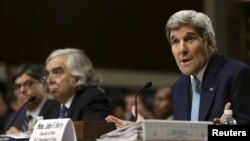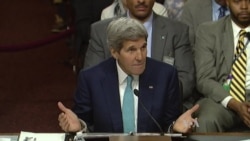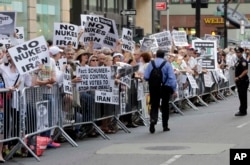Secretary of State John Kerry sparred with members of a Senate committee during the first public hearing on the controversial deal to lift economic and other sanctions against Iran in exchange for it scaling back its nuclear program.
Energy Secretary Ernest Moniz and Treasury Secretary Jack Lew joined Kerry Thursday before the Senate Foreign Relations Committee.
Committee Chairman Bob Corker, a Republican, started off the often contentious hearing by telling Kerry “you’ve been fleeced” by the Iranians regarding the nuclear deal. Later, he amended his comment to "we've been fleeced," without further clarification.
Kerry challenged the accusation, calling it "fantasy, plain and simple," to think the United States failed to hold out for a better deal at the bargaining table.
Iran's program
"Folks, they already have what they want," Kerry said, referring to Iran's nuclear program.
He noted when the nuclear negotiations began more than a decade ago, "Iran had enough fissile material for 10 to 12 bombs. They had 19,000 centrifuges, up from the 163 that they had back in 2003 when the prior administration was engaged in them on this very topic.
WATCH: Kerry Pushes Back in Contentious Senate Hearing on Iran Deal
“So this isn’t a question of giving them what they want. It’s a question of how do you hold their program back. How do you dismantle their weapons program. Not their whole program," he added.
The deal was reached last week in Vienna after tough negotiations between Iran and the Security Council's five permanent members -- Britain, China, France, Russia and the United States -- plus Germany.
"The truth is that the Vienna plan will provide a stronger, more comprehensive, more lasting means of limiting Iran's nuclear program than any alternative that has been spoken of," he said, adding that sanctions alone cannot be expected to prevent Iran from developing a nuclear weapon.
If enacted, the agreement will put Iran under "intense scrutiny forever" and keep the world united in ensuring that its nuclear activities "remain wholly peaceful," Kerry said during the hearing, which lasted more than four hours.
Senator Ben Cardin, the top Democrat on the foreign relations committee, said he has not yet decided how he would vote but said he felt U.S. negotiators had made significant progress.
"Our negotiators got an awful lot, particularly on the nuclear front," Cardin said.
Energy Secretary Moniz, one of the agreement's key architects, spoke to lawmakers' criticisms that loopholes in international inspection will allow Iran to cheat. "I am confident that the technical underpinnings of this deal are solid."
Ultimate goal
During the hearing, Corker said the deal falls short of dismantling Iran's nuclear program.
Kerry countered that critics of the deal are pushing an unrealistic alternative that he dismissed as a "sort of unicorn arrangement involving Iran's complete capitulation."
Kerry, who once chaired the Senate foreign relations committee that Corker now heads, said the purpose of sanctions "was to bring them [Iran] to negotiations."
"The fact is that Iran now has extensive experience with nuclear fuel cycle technology," Kerry told committee members. "We can't bomb that knowledge away. Nor can we sanction that knowledge away."
Issues to be discussed
Responding to Republican criticism that the agreement lifts sanctions too fast, Lew, whose agency enforces many of the sanctions that have squeezed Iran's economy in recent years, said it would not prevent the U.S. from imposing additional sanctions over issues such as human rights violations if it feels it necessary.
The issue of Iran's human rights violations or potential support for militant groups that might attack the United States or its allies have been among the serious concerns of members of Congress as they begin a 60-day period for reviewing the international nuclear agreement.
Lawmakers are also expected to grill the senior administration officials about the timing of sanctions relief and ability to "snap back" sanctions if Iran cheats, clarity on the timing of inspections and more answers about how much money would go to Iran.
They're also likely to press the officials on the military aspects of Iran's nuclear program.
Congressional review
Kerry said that if Congress turns thumbs down on the deal, "the result will be the United States of America walking away from every one of the restrictions we have achieved."
"We will have squandered the best chance we have to solve this problem through peaceful means," he said as Congress began a 60-day review of the deal to decide whether to support or reject it.
The Secretary of State also warned that if the deal is rejected, the diplomatic support the United States has garnered in recent years "would disappear overnight."
Also, the United Nations Security Council voted earlier this week to lift the international sanctions in place, effectively accepting the deal that the United States and other powers have struck with Iran.
As a result, administration officials also said if lawmakers reject the deal, the U.S. would be left trying to enforce more limited sanctions but without the support of other nations that backed the earlier steps.
Congress has until September 17 to approve or reject the deal.
On Wednesday, House Speaker John Boehner vowed Republicans, who control both houses of Congress, will spare no effort to kill the agreement.
"Because a bad deal threatens the security of the American people, we're going to do everything possible to stop it," Boehner said.
If the deal is rejected, President Barack Obama has promised to veto that decision.
To override the veto, it would take a two-thirds majority in both houses of Congress, meaning many members of Obama's Democratic Party would have to join Republicans in rejecting the deal.
If a disapproval resolution passes Congress and survives a veto, Obama would be unable to waive most of the U.S. sanctions imposed on Iran, which could cripple the nuclear pact.
Democrats noncommittal
Many Democratic lawmakers were noncommittal as they emerged from Wednesday's closed-door meetings, saying they need to study the deal more before making a decision.
"I think the deal is a dramatic improvement over the status quo from day one through probably year 10 to 15. Thereafter my questions are about our ability to detect cheating after some of the provisions start to expire," Democratic Senator Tim Kaine said.
Critics of the deal say the verification procedures are not tough enough to ensure Iran is living up to its agreement not to develop a nuclear weapon.
They also express concern the sanctions relief will free up billions for Iran to expand funding for militant groups across the Middle East.
U.S. Defense Secretary Ash Carter is in the Middle East this week, meeting with officials in Israel and Saudi Arabia in order to assuage concerns from leaders there who are afraid the deal will upset the volatile region.
New York protest
Meanwhile, thousands of protesters packed into Times Square Wednesday night to demand that Congress vote down the proposed U.S. deal with Iran.
As the crowd loomed behind police barricades, chants of "Kill the deal!" could be heard for blocks.
The event, billed as the "Stop Iran Rally" consisted mainly of pro-Israel supporters, though organizers said it represents Americans of all faiths and political convictions.
The group is asking Congress to reject the deal under which the U.S. would agree to lift economic sanctions against Iran in return for measures to prevent the country from building nuclear weapons.
Obama has said the U.S. considers Iran an adversary whose activities will be closely monitored.
At the rally, Alan Dershowitz, a prominent Jewish attorney, said he was "opposing the deal as a liberal Democrat." He said he believed democracy was "ignored" because the Obama administration negotiated the deal without congressional input.
"That is not the way democracy should operate," he told the crowd.
Organizers estimated about 10,000 people attended the event.
Some material for this report came from Reuters, AP and AFP.










